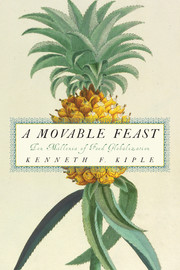Book contents
- Frontmatter
- Contents
- Preface
- Acknowledgments
- INTRODUCTION: FROM FORAGING TO FARMING
- Ch. 1 LAST HUNTERS, FIRST FARMERS
- Ch. 2 BUILDING THE BARNYARD
- Ch. 3 PROMISCUOUS PLANTS OF THE NORTHERN FERTILE CRESCENT
- Ch. 4 PERIPATETIC PLANTS OF EASTERN ASIA
- Ch. 5 FECUND FRINGES OF THE NORTHERN FERTILE CRESCENT
- Ch. 6 CONSEQUENCES OF THE NEOLITHIC
- Ch. 7 ENTERPRISE AND EMPIRES
- Ch. 8 FAITH AND FOODSTUFFS
- Ch. 9 EMPIRES IN THE RUBBLE OF ROME
- Ch. 10 MEDIEVAL PROGRESS AND POVERTY
- Ch. 11 SPAIN'S NEW WORLD, THE NORTHERN HEMISPHERE
- Ch. 12 NEW WORLD, NEW FOODS
- Ch. 13 NEW FOODS IN THE SOUTHERN NEW WORLD
- Ch. 14 THE COLUMBIAN EXCHANGE AND THE OLD WORLDS
- Ch. 15 THE COLUMBIAN EXCHANGE AND NEW WORLDS
- Ch. 16 SUGAR AND NEW BEVERAGES
- Ch. 17 KITCHEN HISPANIZATION
- Ch. 18 PRODUCING PLENTY IN PARADISE
- Ch. 19 THE FRONTIERS OF FOREIGN FOODS
- Ch. 20 CAPITALISM, COLONIALISM, AND CUISINE
- Ch. 21 HOMEMADE FOOD HOMOGENEITY
- Ch. 22 NOTIONS OF NUTRIENTS AND NUTRIMENTS
- Ch. 23 THE PERILS OF PLENTY
- Ch. 24 THE GLOBALIZATION OF PLENTY
- Ch. 25 FAST FOOD, A HYMN TO CELLULITE
- Ch. 26 PARLOUS PLENTY INTO THE TWENTY-FIRST CENTURY
- Ch. 27 PEOPLE AND PLENTY IN THE TWENTY-FIRST CENTURY
- Notes
- Index
Ch. 10 - MEDIEVAL PROGRESS AND POVERTY
Published online by Cambridge University Press: 22 August 2009
- Frontmatter
- Contents
- Preface
- Acknowledgments
- INTRODUCTION: FROM FORAGING TO FARMING
- Ch. 1 LAST HUNTERS, FIRST FARMERS
- Ch. 2 BUILDING THE BARNYARD
- Ch. 3 PROMISCUOUS PLANTS OF THE NORTHERN FERTILE CRESCENT
- Ch. 4 PERIPATETIC PLANTS OF EASTERN ASIA
- Ch. 5 FECUND FRINGES OF THE NORTHERN FERTILE CRESCENT
- Ch. 6 CONSEQUENCES OF THE NEOLITHIC
- Ch. 7 ENTERPRISE AND EMPIRES
- Ch. 8 FAITH AND FOODSTUFFS
- Ch. 9 EMPIRES IN THE RUBBLE OF ROME
- Ch. 10 MEDIEVAL PROGRESS AND POVERTY
- Ch. 11 SPAIN'S NEW WORLD, THE NORTHERN HEMISPHERE
- Ch. 12 NEW WORLD, NEW FOODS
- Ch. 13 NEW FOODS IN THE SOUTHERN NEW WORLD
- Ch. 14 THE COLUMBIAN EXCHANGE AND THE OLD WORLDS
- Ch. 15 THE COLUMBIAN EXCHANGE AND NEW WORLDS
- Ch. 16 SUGAR AND NEW BEVERAGES
- Ch. 17 KITCHEN HISPANIZATION
- Ch. 18 PRODUCING PLENTY IN PARADISE
- Ch. 19 THE FRONTIERS OF FOREIGN FOODS
- Ch. 20 CAPITALISM, COLONIALISM, AND CUISINE
- Ch. 21 HOMEMADE FOOD HOMOGENEITY
- Ch. 22 NOTIONS OF NUTRIENTS AND NUTRIMENTS
- Ch. 23 THE PERILS OF PLENTY
- Ch. 24 THE GLOBALIZATION OF PLENTY
- Ch. 25 FAST FOOD, A HYMN TO CELLULITE
- Ch. 26 PARLOUS PLENTY INTO THE TWENTY-FIRST CENTURY
- Ch. 27 PEOPLE AND PLENTY IN THE TWENTY-FIRST CENTURY
- Notes
- Index
Summary
Mother Nature always comes to the rescue of a society stricken with the problem of overpopulation, and her ministrations are never gentle.
Alfred W. Crosby (1986)ARCHEOLOGICAL EVIDENCE now in the British Museum from West Stow in Suffolk, England, has shed some light on the dietary changes that came about with the fall of Rome. Sheep, goats, and pigs were retained for food, and pigs also for their scavenging ability, and cattle as draft animals. But guinea fowl and peacocks, favorites of the Romans, escaped to die out in the wild. Many rabbits also escaped but were recaptured and maintained in rock enclosures in both Britain and on the Continent. Olive oil vanished as a cooking medium, replaced by butter made mostly from ewe's milk. Wine, too, disappeared with the Romans and ale became the standard beverage.
The Catholic Church, established in England by the sixth century, imposed fasting days and, by the time of the Norman conquest (1066), fishermen from the British Isles had forged an important herring industry. Freshwater fish, eels and other aquatic animals from ponds, streams, and lakes comprised a significant part of the British diet although, because the Church viewed fish as a penitential substitute for meat, the appeal of the former suffered, and physicians, as a rule, regarded fish as a poor nutritional substitute for meat.
- Type
- Chapter
- Information
- A Movable FeastTen Millennia of Food Globalization, pp. 97 - 104Publisher: Cambridge University PressPrint publication year: 2007



